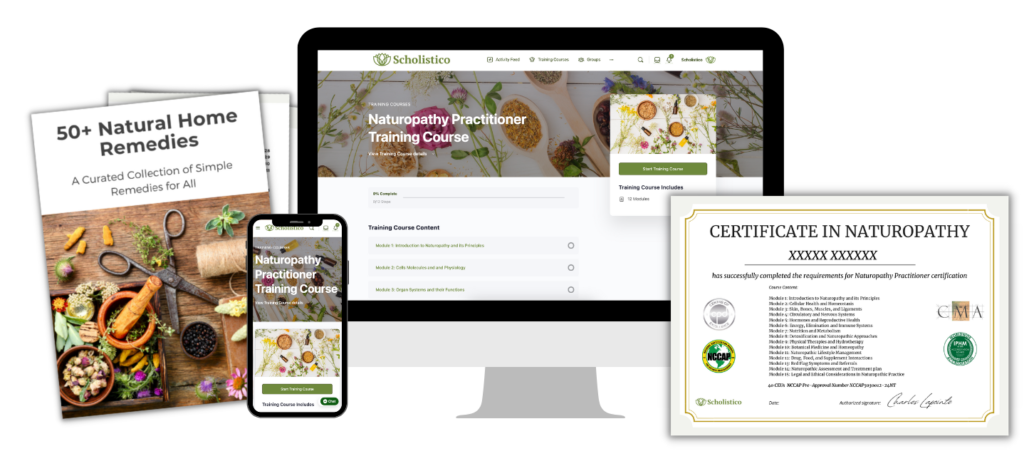Naturopathic Practitioner : 7 Reasons Why Now is the Perfect Time to Become One

Table of Contents
- Reason 1: The Growing Demand for Holistic Health Practitioners
- Reason 2: People’s Disillusionment with the Side Effects of Conventional Medicines
- Reason 3: Empowering Clients to Take Own Health into Hands: The Level of Satisfaction
- Reason 4: Financial Security: The Earning Scope for a Naturopathic Practitioner
- Reason 5: The Growing Body of Evidence Supporting Naturopathy
- Reason 6: Possibilities of Flexible Work and Self-employment
- Reason 7: Making a Difference: The Social Impact of Naturopathic Practitioners
Naturopathy is gaining significant ground in today’s health and wellness landscape. It places the power back into the hands of individuals and emphasizes prevention and self-care, a focus starkly different from the disease-centric perspective of conventional medicine. Providing a commitment to holistic healing, naturopathy treats the entire person — body, mind, and spirit — rather than merely treating symptoms or specific illnesses.
What is Naturopathy?
Naturopathy, or naturopathic medicine, is a distinct healthcare profession emphasizing prevention, treatment, and optimal health utilizing therapeutic methods and substances that encourage an individual’s innate healing processes. It represents a diverse array of natural and holistic modalities, incorporating traditional wisdom and modern science.
- Whole-person approach: This approach emphasizes the importance of seeing the person as a united whole, instead of just a collection of symptoms or diseases.
- Prevention-oriented: Naturopathy aims to prevent diseases before they occur, rather than just treating them when they do.
- Natural healing: It supports the body’s innate ability to heal itself.
- Individualized approach: Each person receives a unique treatment plan tailored to their health conditions and lifestyle.
The rising popularity of naturopathy is a reflection of people’s desire to reclaim control over their health and wellness, bringing a wave of opportunities for those considering a career in the field.
Understanding Naturopathy and Its Principles
Understanding the principles that govern naturopathic practice is paramount to fully comprehend the uniqueness of this discipline. These principles are the philosophical pillars guiding naturopathic practitioners in their work.

Recognizing the Healing Power of Nature
This principle, also known as “Vis Medicatrix Naturae“, acknowledges the body’s inherent ability to heal itself. By utilizing different natural healing techniques and modalities, naturopathic professionals assist the patient’s body in restoring health and achieving balance.
Identifying and Treating the Causes
Rather than merely managing symptoms, naturopathy seeks to uncover and address the root cause of illness. This can often involve a detailed evaluation of the individual’s lifestyle, diet, habits, and mental-emotional state.
First, Do No Harm
Naturopathic practitioners adhere strictly to this rule by using the most natural and least invasive approaches to treatment. Ultimately, they aim not to cause any harm while treating the patient and prioritizing the body’s natural healing processes.
Practitioner as Teacher
Education plays a pivotal role in naturopathy, with practitioners striving to empower their clients through knowledge. The aim is to enable patients to take active roles in their own health, fostering a commitment to lifestyle changes that promote wellbeing.
Treating the Whole Person
This holistic view considers the individual’s physical, mental, emotional, and spiritual aspects, acknowledging that all the systems and organs of the body are interconnected and that health and disease are the outcomes of this complex interaction.
Reason 1: The Growing Demand for Holistic Health Practitioners
Among the reasons why a career in naturopathy can be appealing is the growing demand for this type of health care. The current health and wellness landscape is going through a significant shift. More people than ever before are disenchanted with the conventional, symptom-focused way medicine is practiced. There’s an increasing interest in holistic wellness strategies, including diet, exercise, mindfulness, and stress management.
Table 1 : Known Factors For Growing Demand Of Holistic Health Practitioners
| Factors | Description |
|---|---|
| Rising Health Consciousness | Increased awareness about health and wellness is driving more people to seek holistic health solutions. |
| Preventive Care | More individuals are interested in preventing health issues, rather than treating them as they come, which aligns with the holistic approach. |
| Natural Treatments | A growing number of people are avoiding medications and surgeries in favor of natural treatments. |
| Chronic Conditions | Holistic health practitioners are in demand for their focus on lifestyle changes to manage chronic conditions. |
Public Awareness and Acceptance
Awareness about the benefits of a holistic approach is spreading rapidly, leading more people to seek out practitioners who can provide this care. The public is becoming more knowledgeable about alternatives to traditional medicine and are actively seeking methods to improve their health naturally.
Increasing Integration of Naturopathy in Medical Institutions
Naturopathic practitioners are increasingly being recognized as essential members of multidisciplinary healthcare teams in various medical institutions, delivering a holistic and integrative approach to patient care. Hospitals, cancer treatment centers, and other health-care facilities are incorporating naturopathic practitioners into their teams.
Reason 2: People’s Disillusionment with the Side Effects of Conventional Medicines
Today, a more substantial portion of the global population is becoming exponentially aware of the side effects of modern pharmacological drugs. Albeit their compellingly fast relief, these medicines contain substances that can, over time, become detrimental to our bodies. The endless list of side effects tied with each medication is creating a sense of disillusionment among people, driving the perennial quest for healthier and natural alternatives.

The Issue with Conventional Medicines
Conventional or allopathic medicines follow a disease-centric approach. The primary goal is to combat symptoms rather than address the root cause of the disease. This method, though effective for acute conditions, often falls short when dealing with chronic ailments or preventative care. Moreover, the regular usage of such drugs can lead to various side effects, including dependence, tolerance, physiological damage, and even habit formation.
- Dependence: Patients often find themselves dependent on specific medications, needing them to function correctly.
- Tolerance: Over time, the body can build tolerance to a drug, necessitating an increase in dosage for the same effect.
- Physiological Damage: Certain medications can harm the body’s physiological function when used for an extended period.
- Habit Formation: Some medicines, notably painkillers and antianxiety medications, can lead to addiction or substance abuse disorder.
Reason 3: Empowering Clients to Take Own Health into Hands: The Level of Satisfaction
In a world where individuals are increasingly disconnected from their bodies and health, a key role of a naturopathic practitioner is to empower clients to reclaim control over their well-being. This aspect of the job can be immensely satisfying for many practitioners.
Education and Empowerment
A significant part of the work of naturopathic practitioners involves educating people about their health. By conveying knowledge about the body, its functions, and how lifestyle choices affect overall health, practitioners empower clients to make informed decisions about their health.
By placing significant importance on preventive care and lifestyle modifications, naturopathic medicine instills a sense of responsibility in individuals for their own health. This not only encourages healthier habits but creates a sense of empowerment.
Fulfillment in Helping Others
As a naturopathic practitioner, the success of your clients can bring immense personal fulfillment. Watching a client’s health and wellness improve because of your guidance is a rewarding experience that is hard to match in other professions.
By empowering individuals to take control of their health, naturopathic practitioners are not only aiding individual clients but are also contributing to creating healthier communities. The ripple effect of their work has the potential to positively influence the health of entire communities.
The ability to empower clients to take control of their own health and well-being is just one of the many reasons why now is the right time to become a naturopathic practitioner.
Reason 4: Financial Security: The Earning Scope for a Naturopathic Practitioner

A career as a naturopathic practitioner can be both personally fulfilling and financially stable. Like any profession, salaries can vary widely based on a range of factors. However, the outlook for naturopathic practitioners remains positive, making it a secure career choice.
Income Potential for Naturopathic Practitioners
Income for naturopathic practitioners can depend on many factors, including geographic location, years of experience, specialization, patient load, among others. According to the Bureau of Labor Statistics, earnings for health diagnosing and treating practitioners, a wide category inclusive of naturopathic practitioners, are competitive.
Table 2: Naturopathic Practitioner Earning Potentials
| Factors | Low Earning Potential | High Earning Potential |
|---|---|---|
| Experience Level | Entry-level naturopathic practitioners | Experienced naturopathic practitioners |
| Geographic Location | Areas with less demand for naturopathy | Urban areas with high demand for natural therapies |
| Specialization | General practice naturopathic practitioners | naturopathic practitioners with niche or specialist skills |
| Patient Load | Part-time practice or low patient turnover | Full-time practice or high patient turnover |
Expanding Scope of Naturopathy
The growing interest in holistic and natural health care options is valid proof that the scope for naturopathy is expanding in the market. This increased demand can translate into more job opportunities and better earning potential for naturopathic practitioners.
Avenues for Diversified Income
Apart from providing consultancy services, naturopathic practitioners can diversify their income through various avenues such as teaching, writing, speaking engagements, selling health-care products, managing wellness retreats, and much more.
Independent and Secure Career
For those interested in having their own practice, a career in naturopathy presents the opportunity to be their own boss. This independence, combined with a consistent demand for natural health care services, provides a solid foundation for financial stability.
Being a naturopathic practitioner is a rewarding profession that can provide a stable, secure living while also fulfilling personal aspiration to help others lead healthier lives.
Reason 5: The Growing Body of Evidence Supporting Naturopathy
While naturopathy has ancient roots, modern science is increasingly catching up to validate the various holistic treatments used in this field. The increasing body of scientific evidence reinforcing the effectiveness of naturopathic medicine is another encouraging reason to consider a career as a naturopathic practitioner.

Research-based Validation
More and more research studies are exploring the effectiveness of naturopathic interventions. There’s increasing evidence supporting a host of naturopathic treatments ranging from herbal medicines to mind-body therapies – all demonstrating significant therapeutic effects.
Recognition from Health Institutions and Insurance
Recognition of naturopathic work both within the healthcare industry and from insurers is also growing. Certain insurance policies now cover naturopathic consultations and treatments, providing further credibility to the profession.
Positive Patient Outcomes
Practical evidence from the successful health journeys of patients treated by naturopathic practitioners is perhaps the most compelling evidence. Thousands of people testify to improved health outcomes after seeking help from naturopathic practitioners, particularly for chronic and lifestyle-related health conditions.
Reason 6: Possibilities of Flexible Work and Self-employment
Flexibility is a sought-after feature in any profession, and a career in naturopathy can provide this. Whether you aim to work full-time or part-time, in a multidisciplinary clinic, or simply wish to establish your own practice, the profession of a naturopathic practitioner can cater to a range of circumstances and preferences.
Flexible Hours
As a naturopathic practitioner, you’re likely to have more control over your working hours. Depending on your practice, you can set appointments to fit your schedule.
Solo Practices
If entrepreneurship appeals to you, opening your own naturopathic practice can be an excellent option. This choice allows you to be in control of all business decisions and gives you the freedom to cultivate your work environment.
Work from Anywhere
The rise in telehealth expands traditional boundaries, offering the possibility of practicing virtually. This development allows you to serve patients who may not live in proximity to you, expanding your practice geographically.
Reason 7: Making a Difference: The Social Impact of Naturopathic Practitioners
One of the most rewarding aspects of becoming a naturopathic practitioner is the potential to make a significant social impact. Not only do you have the opportunity to positively affect the lives of individual clients, but the effect of your work can also ripple outwards to influence wider communities and even societal perspectives on health and wellness.
Inspiring Healthier Communities
By teaching and practicing preventative care, naturopathic practitioners play a crucial role in fostering healthier communities which aren’t just less wracked by preventable ailments, but are also more informed about their health.
Addressing Chronic Disease Rates
Given the increasing rates of chronic disease related to lifestyle, naturopathic practitioners provide critical knowledge and implementation strategies for managing such conditions, resulting in less strain on healthcare systems and healthier populations.
Pioneering a Preventative Health Paradigm
The work of naturopathic practitioners promotes a paradigm shift in healthcare, moving away from the superficial treatment of symptoms to preventative, root-cause medicine that treats the whole person.
Scholistico’s Naturopathy Practitioner Certification Course: A Gateway to Your Dream Career
For those inspired to walk this path of transformative health and wellness, one of the fastest, simplest, and most economical ways to get started is with Scholistico’s Naturopathy Practitioner Certification Course.
- Comprehensive Curriculum
- Flexible and Self-Paced Learning
- Interactive Learning Groups and Forums
- Official 30-Day Money back guarantee
- Internationally Accredited Certification
Frequently Asked Questions
What does a naturopathic practitioner do?
A naturopathic practitioner facilitates healing by using therapies that stimulate the body’s own healing mechanisms. They employ an array of natural healing methods, including herbs, physical manipulation, and nutritional counseling, often combined with modern medical treatments.
How long does it take to become a certified naturopathic practitioner?
The time frame varies depending on the program and whether the student is studying full-time or part-time.
Does one need a traditional medical degree to become a naturopathic practitioner?
No, a traditional medical degree is not required, but a strong background in the sciences and a thorough understanding of anatomy, physiology, and other related areas is beneficial in naturopathic study.
Can a naturopathic practitioner write prescriptions?
This varies greatly depending on the jurisdiction where the naturopathic practitioner practices. In some places, naturopathic practitioners can write prescriptions for a specific list of medications, while in others, they cannot.
Is choosing to be a naturopathic practitioner financially viable?
Yes, with the rising demand for holistic care and alternative medicine, the field of naturopathy is growing rapidly. As such, there are growing opportunities for building a financially stable career as a naturopathic practitioner.
Can becoming a naturopathic practitioner allow for work-life balance?
Yes, particularly for those who set up their own practice, naturopathy offers the flexibility to manage your own hours and workload, allowing for a better work-life balance compared to many traditional healthcare roles.
How does the Scholistico’s Naturopathy Practitioner Certification Course prepare individuals for the profession?
The course provides comprehensive education in naturopathic principles, practices, and therapies. It includes theoretical knowledge and practical exposure, equipping students with the necessary skills to start their own practice.
What kind of job opportunities exist for naturopathic practitioners?
Job opportunities for naturopathic practitioners are broad and can include private practice, managing or working in wellness centers, working in integrated healthcare facilities, consulting in the natural health products industry, health writing, and teaching, among other opportunities.









Responses